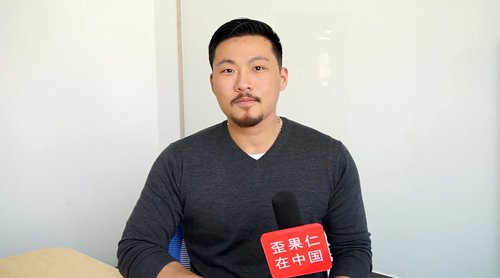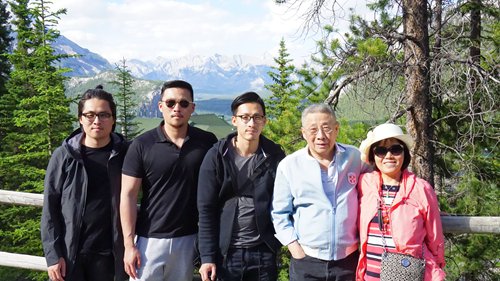METRO SHANGHAI / METRO SHANGHAI
Roots, family, culture, history
Overseas-born ‘third-culture’ Chinese returning for better opportunities
Editor's Note:
Decades ago, many Chinese people spared no efforts and expense to immigrate to developed countries in order to pursue a better life and more job opportunities. Their foreign-born offspring, however, are now attracted by China's rapid development and surging economy in order to realize the Chinese Dream their parents never had. The Global Times recently interviewed several "third-culture" (foreign-born) Chinese who have recently returned to China for work. Sidney Cheung is our first interviewee.
Sidney Cheung, lead instructor at Capstone Shanghai Ltd, was born in 1987 in Hong Kong. His parents emigrated there from the mainland in the 1970s to seek better opportunities and establish themselves. In 1994, the family once again moved, this time to Canada. There, they settled down in a small rural town north of Toronto, where Sidney and his two younger brothers were, at that time, some of the only Chinese. He told the Global Times that Chinese like him are called "third-culture" - of a Chinese background but raised and educated with Western values.
Cheung's father is from Shanghai and his mother from East China's Zhejiang Province. Despite meeting and marrying in Hong Kong, neither of them knew Cantonese when they first arrived, though they quickly adapted. During their time in Hong Kong, they ran a successful business, manufacturing toys for big foreign companies such as Hasbro and Mattel. In 1994, the Cheungs used their savings to immigrate to Canada. Sidney believes that his parents obtained their current station in life by being bold and resilient, the type of fortitude that a life of hardship fosters.
Poverty is one reason why his parents left the Chinese mainland. Throughout Sidney's youth, his parents often recounted to him and his siblings stories about growing up destitute and hungry. Some were about having to pick barely edible plants in the mountains for food, and others about the joy of being able to eat plain boiled eggs on Chinese New Year. The tales were sometimes sweet, but mostly bitter, and they all revealed the reality of the struggles that many Chinese citizens have had to face in the past.
Even though they eventually found success in Hong Kong, the Cheungs nonetheless raised their children with strict, traditional Chinese values; to be helpful and generous toward others, yet remain hard-working, modest and frugal for themselves.
Education and career
Sidney is a Canadian certified school-teacher with a postgraduate Bachelor of Education from the University of Toronto, with advanced qualifications to teach intermediate mathematics. His undergraduate degree was also done at the University of Toronto with a background in neuroscience.
After graduation, he took up a research position at the Chinese University of Hong Kong, studying the efficacy of exercise on academic performance. However, he found his passion from his part-time job teaching. Before joining Capstone, he has taught a variety of subjects and a wide range of students, as well as occasional teaching stints at one of Hong Kong's international schools.
"The reason I moved to Shanghai was a mix of ambition and curiosity," Sidney told the Global Times. "I also wanted to be able to get in touch with my familial hometown roots while also helping the next young generation of China."
Looking forward
Asked by the Global Times to compare the types of opportunities found in Shanghai, Hong Kong and Toronto, Cheung replied, "There are likely more opportunities now in Shanghai; just look at how much this city has changed over the past decade. On a broader scale, China itself has modernized incredibly well. The seamless incorporation of technology into daily life and the rapid expansion and modernization of infrastructure has made the country more interconnected than ever."
"When I was young, I'd occasionally visit Shenzhen and Shanghai for summer holidays, but I didn't know the cities very well. The parks, restaurants and malls I'd go to were nothing like the experience I have now. Shanghai is a fun and vibrant city," Sidney said.
"Things like Ofo, WeChat and Taobao have all made living in Shanghai even more convenient than Toronto and Hong Kong. Even though my Putonghua is bad, I haven't had much difficulty using these tools in my daily life," he added.
Sidney can speak the dialects of Shanghainese and Cantonese, but still has some difficulty with Putonghua. The biggest challenge for him here, then, is mastering Putonghua and its correct tones. He told the Global Times that, "When people communicate with me in Chinese on WeChat, I need to translate to understand. Even when I try to speak Putonghua, most people cannot understand me well. Sometimes they laugh and ask me what language I'm trying to speak [jokingly]."
As Shanghai and Hong Kong are quite similar in terms of their geography, business districts and international culture, Cheung said that more overseas second-generation Chinese like him, who grew up in the US, Canada or other English-speaking countries, will likely return for their career and personal development.
"I think, growing up, my parents tried hard to keep me and my brothers cognizant of our family's culture and roots. Now that I'm older, I understand why," Sidney said. "You'll know where you're going, once you know where you've been."
Decades ago, many Chinese people spared no efforts and expense to immigrate to developed countries in order to pursue a better life and more job opportunities. Their foreign-born offspring, however, are now attracted by China's rapid development and surging economy in order to realize the Chinese Dream their parents never had. The Global Times recently interviewed several "third-culture" (foreign-born) Chinese who have recently returned to China for work. Sidney Cheung is our first interviewee.
Sidney Cheung, lead instructor at Capstone Shanghai Ltd, was born in 1987 in Hong Kong. His parents emigrated there from the mainland in the 1970s to seek better opportunities and establish themselves. In 1994, the family once again moved, this time to Canada. There, they settled down in a small rural town north of Toronto, where Sidney and his two younger brothers were, at that time, some of the only Chinese. He told the Global Times that Chinese like him are called "third-culture" - of a Chinese background but raised and educated with Western values.
Cheung's father is from Shanghai and his mother from East China's Zhejiang Province. Despite meeting and marrying in Hong Kong, neither of them knew Cantonese when they first arrived, though they quickly adapted. During their time in Hong Kong, they ran a successful business, manufacturing toys for big foreign companies such as Hasbro and Mattel. In 1994, the Cheungs used their savings to immigrate to Canada. Sidney believes that his parents obtained their current station in life by being bold and resilient, the type of fortitude that a life of hardship fosters.
Poverty is one reason why his parents left the Chinese mainland. Throughout Sidney's youth, his parents often recounted to him and his siblings stories about growing up destitute and hungry. Some were about having to pick barely edible plants in the mountains for food, and others about the joy of being able to eat plain boiled eggs on Chinese New Year. The tales were sometimes sweet, but mostly bitter, and they all revealed the reality of the struggles that many Chinese citizens have had to face in the past.
Even though they eventually found success in Hong Kong, the Cheungs nonetheless raised their children with strict, traditional Chinese values; to be helpful and generous toward others, yet remain hard-working, modest and frugal for themselves.
Education and career
Sidney is a Canadian certified school-teacher with a postgraduate Bachelor of Education from the University of Toronto, with advanced qualifications to teach intermediate mathematics. His undergraduate degree was also done at the University of Toronto with a background in neuroscience.
After graduation, he took up a research position at the Chinese University of Hong Kong, studying the efficacy of exercise on academic performance. However, he found his passion from his part-time job teaching. Before joining Capstone, he has taught a variety of subjects and a wide range of students, as well as occasional teaching stints at one of Hong Kong's international schools.
"The reason I moved to Shanghai was a mix of ambition and curiosity," Sidney told the Global Times. "I also wanted to be able to get in touch with my familial hometown roots while also helping the next young generation of China."
Looking forward
Asked by the Global Times to compare the types of opportunities found in Shanghai, Hong Kong and Toronto, Cheung replied, "There are likely more opportunities now in Shanghai; just look at how much this city has changed over the past decade. On a broader scale, China itself has modernized incredibly well. The seamless incorporation of technology into daily life and the rapid expansion and modernization of infrastructure has made the country more interconnected than ever."
"When I was young, I'd occasionally visit Shenzhen and Shanghai for summer holidays, but I didn't know the cities very well. The parks, restaurants and malls I'd go to were nothing like the experience I have now. Shanghai is a fun and vibrant city," Sidney said.
"Things like Ofo, WeChat and Taobao have all made living in Shanghai even more convenient than Toronto and Hong Kong. Even though my Putonghua is bad, I haven't had much difficulty using these tools in my daily life," he added.
Sidney can speak the dialects of Shanghainese and Cantonese, but still has some difficulty with Putonghua. The biggest challenge for him here, then, is mastering Putonghua and its correct tones. He told the Global Times that, "When people communicate with me in Chinese on WeChat, I need to translate to understand. Even when I try to speak Putonghua, most people cannot understand me well. Sometimes they laugh and ask me what language I'm trying to speak [jokingly]."
As Shanghai and Hong Kong are quite similar in terms of their geography, business districts and international culture, Cheung said that more overseas second-generation Chinese like him, who grew up in the US, Canada or other English-speaking countries, will likely return for their career and personal development.
"I think, growing up, my parents tried hard to keep me and my brothers cognizant of our family's culture and roots. Now that I'm older, I understand why," Sidney said. "You'll know where you're going, once you know where you've been."

Sidney Cheung

A 2017 family photo in Banff, Canada Photos: Courtesy of Sidney Cheung

